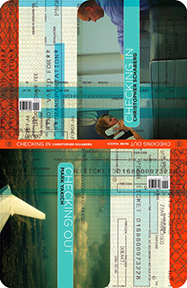This story dates back to the 1970’s, so all statutes of limitations have expired and airline procedures have changed. In the pre-9/11 era, occasionally “bomb threats” could be traced to the last passenger to arrive at the aircraft.
A business man, running late for his flight, would make a call to the airline reservation system, mention the word “bomb” and hang up. The airline would be forced to take a delay to run safety checks allowing the tardy passenger to make his flight. After several arrests/investigations this activity stopped.
I was a new captain on the airline. We were sitting at the gate in a DC-9 when the agent ran down the jet-way and from a distance yelled, “Captain, call Operations.”
The fact that he ran was our first clue. Calling from a distance was the second.
I tuned the radio to the company frequency and made the call. “Ops, Delta 123. What’s up?”
“Stand by, Delta 123. You may have a bomb threat.”
“May?”
“Right, we’re checking it out and will get right back to you.”
The passengers had already been placed on board. “Be quick.”
A long two or three minutes passed.
“Yep, it’s you.”
“No problem, I will get the people off the bird and back into the terminal.” I tried to put on my calm pilot voice.
“You can’t do that, Captain. You have to wait for a senior agent to come to your gate and make the announcement.”
Heck of a thing to do during a situation like that but the co-pilot and I looked at each other and laughed. I keyed the mike and asked if we had to wait too. This call was not answered.
I made an announcement telling my passengers that I felt certain this was a prank and advised them to take their time, gather their carry-on luggage, and deplane through the forward door. I then told them while there was no need to panic or rush, expeditious movement would be appreciated as I could not leave until they did.
There was no bomb and we survived.
* * *
On one flight into New Orleans, we lowered the landing gear on approach as usual. But the nose gear did not indicate down and locked. We broke out of the pattern and headed for Lake Ponchartrain. I made an announcement to the people that we had an indication that the nose gear did not function normally.
“Gear unsafe” is not a cool thing to say to passengers.
I advised them that we would be circling over the lake to attempt to resolve the indication. Again, note we did not say “resolve the problem.”
Well, we could not get the damn light to go from red to green. We declared an emergency and headed for the runway. I told the passengers that while the little light in the cockpit did not say so, I felt certain that the nose gear was down and locked. “I mention this because as we land you will see lots of airport vehicles with flashing lights nearby in case we need assistance.”
I did not say fire trucks as this is a bad phrase.
“But just to be doubly safe, I will hold the nose up longer than normal and will wait until we are going real slow before I lower it to the runway.”
There was nothing to gain by saying that below 70 knots the elevator was no longer effective and the nose would slam to the runway.
Well, I was right, everything worked normally. As the people were getting off the aircraft, my co-pilot and I stood in the doorway thanking them for selecting our airline.
Two nuns came to the door and grabbed my hand, thanking me.
I told them that if I had known they were on board I would have told the rest of the passengers we had absolutely nothing to worry about.
All the people were off the aircraft and the co-pilot and I were getting our flight kits and suitcases out of the cockpit when the agent approached.
“Smooth, you all,” he said with a smile.
I nodded.
“Yep,” he said, “two nuns came up to me and asked if they could exchange their return flight tickets for bus tickets.”
Jack Saux was a pilot for 34 years. He is the author of Clueless in New Orleans, Adventures in Adolescence and The Pilot and the Fairy Princess. He lives in New Orleans.






